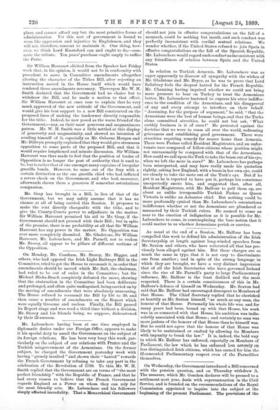Sir William Harcourt elicited from the Speaker last Friday week
that, in his opinion, it would not be in conformity with precedent to move in Committee amendments altogether altering the character of the Tithes Bill, after rejecting an instruction moved in the House itself which would have rendered those amendments necessary. Thereupon Mr. W. H. Smith declared that the Government had no choice but to withdraw the Bill, and he made a motion to that effect. Sir William Harcourt at once rose to explain that he very much approved of the new attitude of the Government, and would give his best support to a new Bill constructed on the proposed lines of making the landowner directly responsible for the tithe. Indeed, he now posed as the warm friend of the Government,—nay, as their most generous and magnanimous patron. Mr. W. H. Smith was a little nettled at this display of generosity and magnanimity, and showed no intention of availing himself of it, especially as Mr. Osborne Morgan and Mr. Dillwyn promptly explained that they would give strenuous opposition to some parts of the proposed 'Bill, and that it would require lengthened and minute discussion. Sir William Harcourt was thus made to feel that the position of leader of Opposition is no longer the post of authority that it used to be, but is rather that of one amongst many captains of irregular guerilla bands. However, he came out of the fray with a certain distinction as the one guerilla chief who had inflicted a severe check on the Government, and who had, moreover, afterwards shown them a generous if somewhat ostentatious compassion.


































 Previous page
Previous page